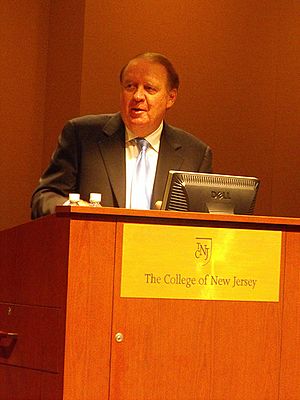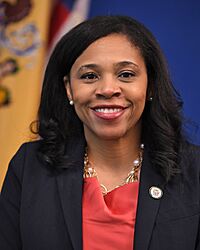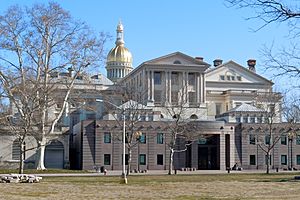Lieutenant Governor of New Jersey facts for kids
Quick facts for kids Lieutenant Governor ofNew Jersey |
|
|---|---|

|
|
| Style |
|
| Term length | Four years, renewable once consecutively |
| Constituting instrument | New Jersey Constitution of 1947 (as amended, effective January 17, 2006) |
| Inaugural holder | Kim Guadagno (2010) |
| Formation | January 19, 2010 |
| Succession | First |
| Salary | $175,000 (per year) |
The lieutenant governor of New Jersey is an important elected official in the state government. This person is the second highest-ranking official in New Jersey. They are chosen at the same time as the governor for a four-year term.
The lieutenant governor's main job is to be ready to take over if the governor cannot serve. The state constitution also says the lieutenant governor must lead a major department or agency within the governor's team. They cannot, however, be the Attorney General.
Before 2010, New Jersey did not have a lieutenant governor. If the governor's office became empty, the president of the State Senate would take over. This was the rule for most of the state's history.
After a few times when New Jersey had several "acting governors" in a short period, people wanted a better solution. This happened when Governor Christine Todd Whitman resigned in 2001 and Governor James E. McGreevey resigned in 2004. To fix this, voters approved a change to the state's constitution in 2006. This change created the position of lieutenant governor. The first lieutenant governor was elected in 2009.
Republican Kim Guadagno was the first person to hold this job. She was chosen by Governor Chris Christie to run with him in the 2009 election. In 2017, Democrat Sheila Oliver was elected lieutenant governor with Governor Phil Murphy. She was the state's second lieutenant governor and served until her death on August 1, 2023. After her passing, Tahesha Way was appointed lieutenant governor on September 8, 2023.
Contents
How New Jersey Governors Were Replaced (1776–2001)

Before the lieutenant governor job was created, the only statewide elected official was the governor. New Jersey was one of the few states without a lieutenant governor. The state constitution also did not allow for elections for other top government jobs. Instead, the governor appointed the heads of departments. Because of this, New Jersey's governor was seen as very powerful.
If the governor's office became empty, the president of the New Jersey State Senate would become the acting governor. They did not have to leave their Senate seat. If the Senate president could not serve, the speaker of the New Jersey General Assembly would take over. This rule was in the state's first constitution in 1776 and continued until 2006.
Over the years, people suggested creating a lieutenant governor position, but these ideas were rejected. For example, Governor Alfred E. Driscoll proposed it in 1947 when the state was writing a new constitution. His idea was not approved.
In 1986, Governor Thomas Kean also suggested creating the office. However, his proposal was not successful.
Creating the Lieutenant Governor Office (2001–Present)
Why the Office Was Needed (2001–2006)

New Jersey had a few times when several politicians served as governor in a short period. In 2001, Governor Christine Todd Whitman resigned. She was appointed to a federal job. Senate President Donald DiFrancesco became acting governor until he retired in 2002.
In 2002, something unusual happened. The state Senate had an equal number of Republicans and Democrats. They chose two senators to be co-presidents. Because of a short gap before the new governor was sworn in, four different people served as acting governor:
- Outgoing Senate President Donald DiFrancesco continued for a few hours.
- Attorney General John Farmer Jr. was acting governor for a very short time.
- Senate co-President John O. Bennett served for four days.
- Senate co-President Richard Codey served for three days until the new governor was sworn in.
After Governor Jim McGreevey resigned in 2004, Richard Codey served as acting governor again. This time, he was the only acting governor because Democrats controlled the Senate. Codey's time as acting governor ended when Governor Jon Corzine took office in 2006.
These events made people realize the state needed a permanent solution for who takes over the governor's office. There were three main reasons for creating a lieutenant governor:
- The Senate president was chosen by other senators, not by all voters. This meant someone not elected by everyone could become governor.
- An acting governor who was also a senator had too much power. This went against the idea of "separation of powers" between different parts of the government.
- There could be problems if an acting governor from a different political party took over. Their policies might clash with the previous governor's plans.
Voters Approve a Constitutional Change
In 2005, the state legislature voted to propose a change to the constitution. This change would create the lieutenant governor position. Voters then had to approve this idea in the general election on November 8, 2005. If approved, it would start with the next governor election in 2009.
The question on the ballot asked voters if they wanted to create the office of lieutenant governor. It also asked about the rules for the job, like how long the term would be and what the duties were.
Voters approved the change with 56.1% of the votes. This meant New Jersey would have its first lieutenant governor in 2009.
After this, if the governor's office became empty before 2009, the Senate president would take over. If they couldn't, the Assembly speaker would. These legislative leaders would have to leave their legislative seats if they became governor.
For example, when Governor Corzine attended a swearing-in ceremony in Washington, D.C., in 2006, Richard Codey briefly served as acting governor again. Codey also served as acting governor in 2007 when Corzine was recovering from a car accident.
In a very unusual event in December 2006, the state transportation commissioner, Kris Kolluri, served as acting governor for one day. This happened because the governor, Senate president, Assembly speaker, and attorney general were all out of state.
The 2009 Governor Election
New Jersey elected its first lieutenant governor in 2009. Before the election, a new law was passed to make it clear when a governor candidate had to choose their running mate. This law gave candidates more time to pick someone for lieutenant governor.
The three main candidates for governor chose their running mates:
- Governor Jon Corzine (Democrat) chose State Senator Loretta Weinberg.
- Chris Christie (Republican) chose Monmouth County Sheriff Kim Guadagno.
- Independent candidate Chris Daggett chose Frank J. Esposito.
On November 3, 2009, Chris Christie won the election. This meant Kim Guadagno became New Jersey's first lieutenant governor. They were sworn into office on January 19, 2010.
Later Elections
In the 2013 election, Kim Guadagno was again chosen as Christie's running mate. They won against the Democratic candidates. In 2017, Guadagno ran for governor and chose Woodcliff Lake Mayor Carlos Rendo as her running mate. However, they lost to the Democratic team of Phil Murphy and Sheila Oliver.
Murphy and Oliver were re-elected on November 2, 2021. They defeated the Republican candidates.
The lieutenant governor position became empty when Sheila Oliver passed away on August 1, 2023. Governor Murphy then chose Secretary of State Tahesha Way to become lieutenant governor. She also continued to serve as Secretary of State.
Rules for the Lieutenant Governor
Who Can Be Lieutenant Governor and What They Do
The state constitution says that to be lieutenant governor, a person must meet the same requirements as the governor. This means they must be at least 30 years old, a U.S. citizen for 20 years, and a New Jersey resident for at least seven years.
The governor candidate chooses their running mate for lieutenant governor within 30 days after the primary election results are official. The governor and lieutenant governor must belong to the same political party. They run together, are elected together, and serve the same four-year term.
The lieutenant governor must also be appointed to lead a cabinet-level department or agency. However, they cannot be the state's attorney general.
Who Takes Over if the Governor's Office is Empty
The state constitution explains who takes over if the governor's office becomes empty.
- If the governor dies, resigns, or is removed, the lieutenant governor becomes governor.
- If both the governor and lieutenant governor offices are empty at the same time, the president of the Senate becomes governor.
- If the Senate president cannot serve, then the speaker of the General Assembly becomes governor.
- If the lieutenant governor becomes governor, or if both offices are empty, a new governor and lieutenant governor will be elected in the next general election to finish the term.
If the lieutenant governor's office becomes empty, the governor must appoint a new lieutenant governor within 45 days to finish the term.
Lieutenant Governors in Colonial Times (1702–1776)
During the colonial period, New Jersey was first divided into two separate colonies. In 1702, these were joined into one colony ruled by a royal governor appointed by the British Queen.
Only two people were officially called Lieutenant Governor of New Jersey during colonial times. This job existed only for two short periods: 1702–1709 and 1755–1757. For most of the colonial period, if the royal governor was absent or died, the president of the Provincial Council would act as governor.
Richard Ingoldesby was the first colonial lieutenant governor (1702–1710). He served under two royal governors. He briefly became acting governor after the second governor died. However, his authority was questioned, and he was removed from his position.
The second colonial lieutenant governor was Thomas Pownall (1755–1757). He was appointed under Governor Jonathan Belcher, who was in poor health. Pownall later became the Royal Governor of Massachusetts. When Governor Belcher died, Pownall did not take over in New Jersey. Instead, John Reading became "acting governor," continuing the old tradition.
From 1710 until Pownall's time, several royal governors died in office. They were replaced by acting governors from the provincial council. Some of these acting governors also died in office and were replaced by others.
List of Lieutenant Governors
Colonial Period
| Portrait | Lieutenant Governor | In office | Appointed by | Royal governor |
|---|---|---|---|---|
| — | Richard Ingoldesby (d. 1719) |
1702–1710 | Queen Anne |
|
 |
Thomas Pownall (1722–1805) |
1755–1757 | King George II |
|
Modern Era (2010–Present)
Democrat (2) Republican (1)
| # | Picture | Lieutenant Governor | Party | In office | Governor | Position in Cabinet |
|---|---|---|---|---|---|---|
| 1 |  |
Kim Guadagno (b. 1959) |
Republican | January 19, 2010 – January 16, 2018 | Chris Christie | Secretary of State |
| 2 |  |
Sheila Oliver (1952–2023) |
Democratic | January 16, 2018 – August 1, 2023 | Phil Murphy | Commissioner of Community Affairs |
| Office vacant from August 1–September 8, 2023 | N/A | |||||
| 3 |  |
Tahesha Way (b. 1971 or 1972) |
Democratic | September 8, 2023 – present | Secretary of State | |
See also
 | Chris Smalls |
 | Fred Hampton |
 | Ralph Abernathy |




